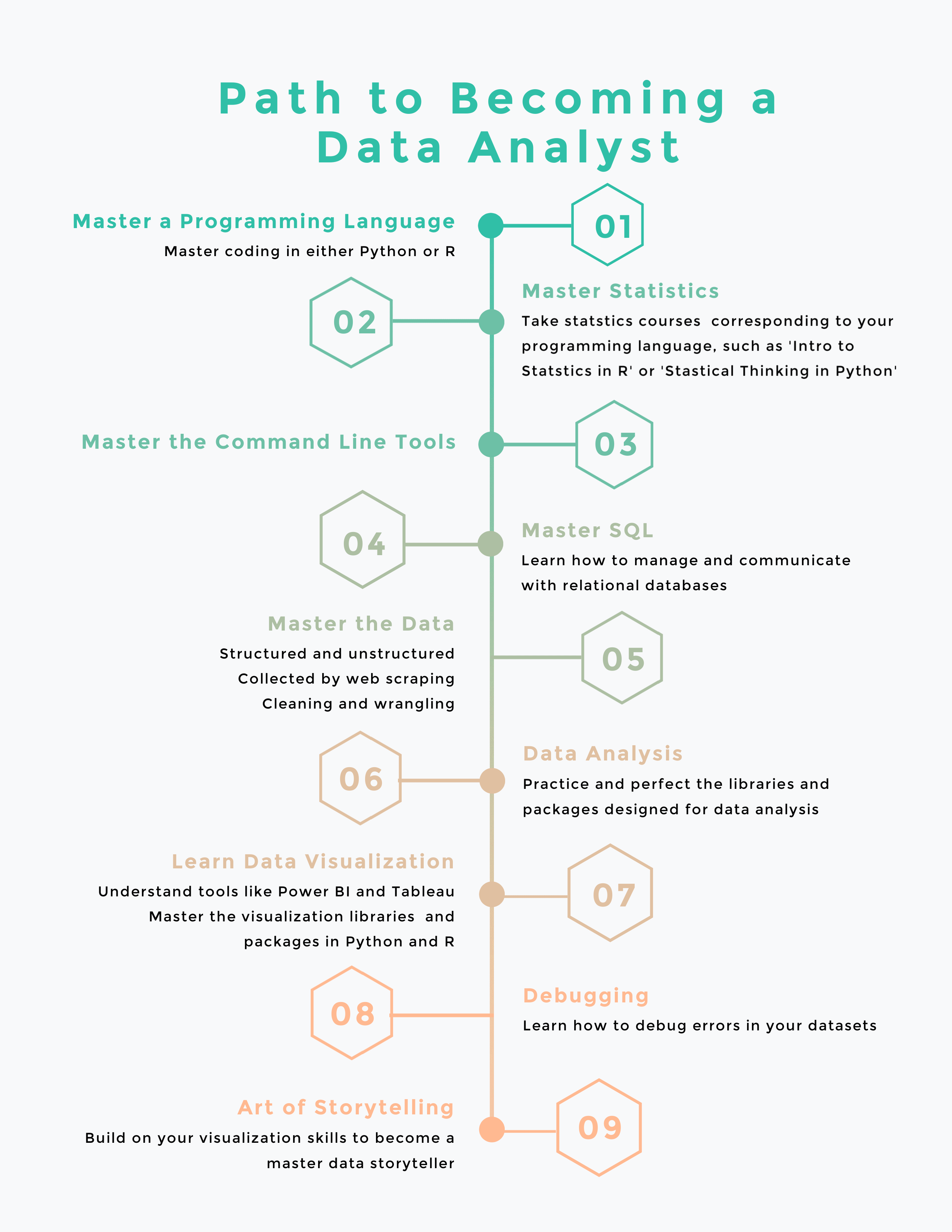Getting a job as a data analyst can be challenging. Data analytics is a rapidly growing field, with many companies seeking experienced professionals to analyze their data.
While it is possible to find a job as a data analyst, it can be a competitive and challenging process. To succeed in this field, you will need to have a strong understanding of data analysis techniques and tools, as well as experience working with data.
Additionally, you will need to be able to communicate your findings effectively to stakeholders, and be able to work well as part of a team. With the right skills and experience, however, you can find a fulfilling and rewarding career as a data analyst.

Credit: www.datacamp.com
The Rise Of Data Analysis
Demand For Data Analysts In The Job Market
As businesses increasingly rely on data to make informed decisions, the demand for data analysts has skyrocketed. Companies across various industries are seeking professionals who can interpret and analyze data to drive strategic initiatives. This surge in demand has created numerous job opportunities for individuals skilled in data analysis.
Impact Of Big Data On Career Opportunities
The emergence of big data has revolutionized the job market, particularly for data analysts. With the vast volume of data generated daily, organizations are in dire need of experts who can derive actionable insights from this wealth of information. As a result, the impact of big data has significantly expanded career opportunities for data analysts, paving the way for lucrative and fulfilling roles in the field.
Credit: www.quora.com
Qualifications For A Data Analyst
When considering a career as a data analyst, it’s crucial to understand the qualifications required for this role. Data analysts play a vital role in helping companies make informed decisions based on data-driven insights. To excel in this field, individuals need to possess the right educational background, a specific skill set, and technical expertise.
Educational Requirements
To become a successful data analyst, a strong educational foundation is essential. Most employers seek candidates with a bachelor’s degree in fields such as statistics, mathematics, computer science, or economics. Some roles may require a master’s degree, particularly for more advanced or specialized positions. Additionally, obtaining certifications in data analysis tools and programming languages can significantly enhance one’s credentials.
Skill Set And Technical Expertise
Data analysts must possess a diverse skill set and technical expertise to thrive in their roles. This includes strong analytical skills, the ability to interpret complex data sets, and proficiency in statistical analysis. Moreover, proficiency in programming languages such as Python, R, and SQL is highly valued. Familiarity with data visualization tools like Tableau or Power BI is also advantageous. Effective communication and problem-solving skills are equally important for effectively conveying insights and addressing challenges.
The Job Search Experience
Searching For Data Analyst Positions
When searching for data analyst positions, it’s essential to utilize various job search platforms and networking opportunities. Job seekers can explore job boards, company websites, and professional networking sites like LinkedIn to find relevant openings. Customizing your resume and cover letter for each application can help to stand out from the competition.
Common Challenges For Applicants
Applicants for data analyst roles often face common challenges during the job search process. These may include fierce competition from other qualified candidates, lack of experience, or specific technical skills required by employers. Additionally, navigating through applicant tracking systems and understanding the specific requirements of each job posting can pose challenges for job seekers.
Crafting A Winning Resume
When applying for a data analyst role, having a standout resume is crucial. Tailoring your CV specifically for data analysis positions and highlighting relevant experience and projects can significantly increase your chances of landing the job.
Tailoring Your Cv For Data Analysis Roles
- Focus on relevant skills like data manipulation, statistical analysis, and data visualization.
- Use keywords from the job description to optimize your resume for applicant tracking systems.
- Showcase your proficiency in tools like SQL, Python, R, and Tableau.
Highlighting Relevant Experience And Projects
- Emphasize data-related achievements in previous roles.
- Showcase projects that demonstrate your ability to analyze and interpret data effectively.
- Quantify your impact with specific metrics and outcomes.
Acing The Data Analyst Interview
Acing the Data Analyst Interview is crucial for landing a job in this competitive field. Employers are looking for candidates who not only have the necessary technical skills but also possess strong analytical thinking and problem-solving abilities. In this section, we will explore some typical interview questions and discuss how to demonstrate your analytical thinking and problem-solving skills effectively.
Typical Interview Questions
During a data analyst interview, you can expect to be asked a variety of questions to assess your knowledge and experience. Some typical interview questions for data analysts include:
- Can you explain the process of data cleaning and data validation?
- How do you handle missing data in a dataset?
- What programming languages and tools are you proficient in?
- Describe a time when you had to work with a large dataset. How did you approach the analysis?
- Have you ever faced a challenging data analysis problem? How did you solve it?
Demonstrating Analytical Thinking And Problem-solving Skills
As a data analyst, it is crucial to showcase your analytical thinking and problem-solving skills during the interview. Here are a few tips to help you demonstrate these skills effectively:
- Clearly explain your thought process: When answering questions, make sure to articulate your thinking process step by step. This will show the interviewer that you approach problems in a logical and structured manner.
- Provide real-life examples: Whenever possible, use real-life examples to illustrate how you have applied your analytical thinking and problem-solving skills in previous projects or work experiences.
- Highlight your ability to handle complex data: Emphasize your experience with handling large datasets and complex data analysis tasks. Discuss any challenges you encountered and how you overcame them.
- Showcase your attention to detail: Data analysis requires a keen eye for detail. Mention how you have successfully identified and resolved errors or inconsistencies in data during your previous projects.
- Discuss your collaboration skills: Data analysis often involves working in teams. Talk about your ability to collaborate effectively with colleagues, stakeholders, and other departments to solve complex problems.
By following these tips and preparing thoughtful answers to typical interview questions, you can increase your chances of acing the data analyst interview and securing a job in this exciting field.
The Role Of Networking And Mentorship
Networking and mentorship play a crucial role in securing a data analyst job. Building connections within the industry and seeking guidance from experienced professionals can provide valuable insights and opportunities. By leveraging these relationships, aspiring data analysts can gain a competitive edge in the job market.
Leveraging Professional Networks
Building and maintaining a strong professional network is crucial for aspiring data analysts. Networking opens up opportunities for job referrals, industry insights, and valuable connections that can propel your career forward. Online platforms such as LinkedIn and professional forums provide avenues to connect with like-minded professionals, potential employers, and industry experts.
Here are a few strategies to leverage your professional network:
- Attend industry conferences and events to meet fellow data analysts and potential employers.
- Join relevant data science groups on social media platforms to engage in discussions and share insights.
- Participate in online forums and communities to connect with experts in the field.
- Reach out to alumni networks or former colleagues who may have valuable connections or job opportunities.
- Regularly update your LinkedIn profile and connect with professionals in your desired industry.
Finding Mentors In The Data Science Community
Mentorship plays a significant role in the career development of data analysts. A mentor can provide guidance, offer valuable insights, and help you navigate the challenges and opportunities in the field. Finding mentors within the data science community can help you expand your knowledge, gain practical skills, and make informed career decisions.
Consider the following approaches to find mentors:
- Reach out to professionals in your network who have experience in data analysis and request their mentorship.
- Join data science mentorship programs or initiatives that connect aspiring data analysts with experienced professionals.
- Attend industry events and networking sessions to meet potential mentors and establish meaningful connections.
- Engage with data science communities and contribute to discussions to catch the attention of experienced professionals who may be willing to mentor.
Industry Expectations Vs. Reality
Industry Expectations vs. Reality: The field of data analysis is often glamorized, but the reality of working as a data analyst can be quite different from what is portrayed. Let’s explore the Myths About Working as a Data Analyst and the Real-World Job Demands and Work Environment that data analysts face.
Myths About Working As A Data Analyst
- Data analysts only work with numbers and statistics.
- Data analysis is a solitary job with minimal interaction.
- Data analysts spend all their time creating complex models.
Real-world Job Demands And Work Environment
Being a data analyst goes beyond just crunching numbers. It involves collaborating with teams, communicating findings, and adapting to constantly evolving technology.
Navigating The Future Of Data Analysis Careers
The field of data analysis is constantly evolving, and with the rapid advancements in technology, it’s essential for professionals in this industry to stay updated with the latest trends and tools. Navigating the future of data analysis careers requires a proactive approach to learning and adapting to the changing landscape of the industry. In this article, we will explore the key strategies for staying current with emerging technologies, continuing education, and career advancement in the field of data analysis.
Staying Current With Emerging Technologies
Staying abreast of emerging technologies is crucial for data analysts to remain competitive in the job market. The rapid evolution of data analysis tools and techniques demands continuous learning and adaptation. Data analysts should actively seek out opportunities to learn about new technologies, such as machine learning, artificial intelligence, and advanced data visualization tools.
Continuing Education And Career Advancement
Continuing education plays a pivotal role in the career advancement of data analysts. Pursuing advanced certifications, enrolling in specialized courses, and attending industry conferences can provide valuable insights and networking opportunities. Moreover, seeking mentorship from experienced professionals can offer guidance and support in navigating the complexities of the evolving data analysis landscape.

Credit: hackr.io
Frequently Asked Questions
Is It Difficult To Find A Job As A Data Analyst?
Finding a job as a data analyst can be competitive. However, with the right skills and experience, it is possible to secure a position in this field. Networking and gaining relevant qualifications can help improve your job prospects. Keep an eye on job boards and be proactive in your search.
Is Data Analytics Hard To Get Into?
Data analytics can be challenging to break into, but with dedication and continuous learning, it’s achievable.
Can I Get Data Analyst Job Easily?
Securing a data analyst job may require relevant skills and experience, but opportunities exist for qualified candidates.
Is There A Demand For Data Analysts?
Yes, there is a high demand for data analysts in today’s job market. Companies across various industries require professionals with analytical skills to interpret data, identify trends, and make informed decisions. The demand for data analysts is expected to grow in the future, making it a promising career choice for individuals with a passion for data analysis.
Conclusion
In the competitive job market, landing a data analyst role can be challenging. However, with the right skills and persistence, it’s possible to secure a position. Stay updated on industry trends and continuously improve your expertise to stand out to potential employers.
Your determination will pay off in the long run.


